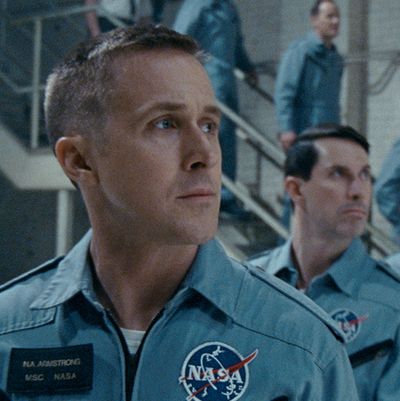
Damien Chazelle’s intimate, overpowering Neil Armstrong film First Man opens with deafening rattles, a shaking that blurs what we half-see, swerving close-ups of the eyes of Armstrong (Ryan Gosling), and glimpses of primitive-looking dials with numbers that go up when they should be going down. It’s 1961 over the Mojave Desert, and Armstrong is testing a plane that isn’t behaving like it should. But there’s a moment when the wild, gut-churning onrush seems almost worth it. The shaking stops, everything’s quiet, and Armstrong beholds the stratosphere, the sky layered with orange and white and deep violet — until the nose of the plane turns downward and the rattles return with a vengeance.
Chazelle’s opening sequence hooks you on so many levels you can get motion-sick thinking back on it. In 1961, humans have passed Mach 1 but to inhabit those higher Machs it will take what my Yiddish-speaking ancestors called a macher. Armstrong is just the macher the U.S. needs, but he’s also a man with firm ties to the ground. His little daughter has a tumor growing inside her, and at home Armstrong pores over documents and makes endless calculations. Part of him dies with the little girl, for whom his wife, Janet (Claire Foy), never sees him grieve. When he gets the phone call saying that he has been picked by NASA for the Gemini/Apollo program, his expression doesn’t change. He tonelessly gives Janet the news, says it will be a fresh start, and leaves the room.
Chazelle’s other movies — Guy and Madeline on a Park Bench, Whiplash, and La La Land — have centered on artists who sacrifice earthly relationships to reach an artistic and/or professional stratosphere. Armstrong, Chazelle’s first nonartist protagonist, didn’t sign up to make those sacrifices, but the space race is killing men all around him, and so he’s always on the precipice of death. First Man might be the most grounded space movie ever made — grounded in the tension between technology that’s almost laughably fragile (the astronauts really do seem as if they’re going up in tin cans) and the sheer evolutionary imperative of family.
Chazelle and his crack editor, Tom Cross, have taken a militant stance against fluidity, let alone lyricism. Even when the capsule bearing Armstrong and “Buzz” Aldrin (Corey Stoll) descends toward the boulder-pocked lunar surface, the tonal fluctuations are wild. They cut to the dropping fuel gauge and ABORT button, while composer Justin Hurwitz punctuates his exquisite harmonies with bangs that sound like metal coils being smashed. It’s only when we hear the reassuringly movie-ish theremin that we know we’re on terra — I mean luna — firma. I was lucky to see First Man on an IMAX screen in Toronto — the very first permanent IMAX screen, circa 1971 — and the first panorama of the lunar surface made the audience gasp. Chazelle doesn’t lay on the triumphal music. He cuts the sound out altogether. The silence is exultant.
It’s a strange-looking movie. Linus Sandgren’s camera comes in so close that you can read every freckle on Claire Foy — which is a good thing because Foy doesn’t have many lines and suggests thought and feeling through the tension in her muscles. Because she doesn’t say much and her role conforms broadly to the stick-in-the-mud-wife template, I fear people won’t recognize how superb a performance she’s giving. Janet’s fear that she and her surviving children (two boys) will lose a husband and father manifests itself as anger, and the anger manifests itself in the tightness of her neck and shoulders and the set of her big jaw. Her short hair grips to her head, while her blues eyes burn into Armstrong’s. It’s no wonder he can’t face her after an accident that leaves the side of his face bloodied. He walks dazed into his house and then turns around and walks back out again. He drives away, leaving her staring at his receding car.
Gosling reserves his familiar grins for brief moments when lost shuttles come into view or, after long moments of cool, expressionless calculation, things going wrong go suddenly right. He’s less than half there with everyone — even his supervisor, Deke Slayton (Kyle Chandler), and best friend, Ed White (Jason Clarke). Gosling’s eyes seem smaller here, maybe because he turns them inward, toward more calculations, more vectors. But we understand that his impassivity is volatile — we pick up the inner tremors. Josh Singer’s good script (based on a book by James R. Hansen) is full of scenes in which Armstrong is torn between his kids asking him to play and the papers on his lap. Those are the only times you see Armstrong’s fear. He sticks with the papers.
You might have heard about the right-wing hysteria over the absence of that all-important American flag-planting on the moon. Balls. American flags are all over First Man. But so are reminders of the ongoing Vietnam War, as well as the protests that surrounded NASA’s massive expenditures at a time when American cities were collapsing. (We hear a verse of Gil Scott Heron’s “Whitey’s on the Moon.”) But no one can doubt that Chazelle’s heart is in the lunar highlands.
Some films — La La Land, for example — feel light on their feet, effortless. First Man is laborious. That’s the point. Every knob, every hinge, every personality quirk of every astronaut or technician or overseer was liable to have shattering consequences. The moon was hard-earned and so was this movie. It’s a stupendous feat.
*A version of this article appears in the October 1, 2018, issue of New York Magazine. Subscribe Now!
First Man was nominated for four Oscars in 2019, including Best Sound Editing, Best Sound Mixing, Best Visual Effects, and Best Production Design.


